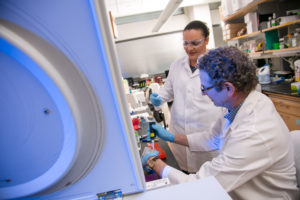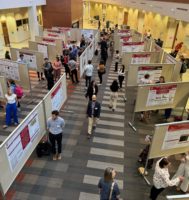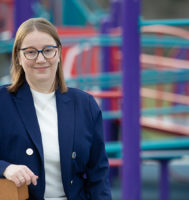 The increasing burden of fungal disease in the world combined with the emergence of treatment resistant organisms is an alarming challenge to medicine and human health.
The increasing burden of fungal disease in the world combined with the emergence of treatment resistant organisms is an alarming challenge to medicine and human health.
The Klein Research Group is a molecular medical mycology research group with two broad areas of focus: fungal pathogenesis and immunology.
Our primary research interest is the pathogen Blastomyces dermatitidis, a thermally dimorphic fungus endemic in Wisconsin and the Mississippi, Ohio, and Missouri river valleys. Blastomyces is a primary human pathogen and is a useful model for the other pathogenic dimorphic fungi such as Histoplasma capsulatum, Coccidioides immitis, Paracoccidioides brasiliensis, Sporothrix schenckii, and Penicillium marneffei, Blastomyces exists as a mold in the soil but transitions to a yeast form at 37°C. Infection occurs when the spore or mold form is inhaled to the lungs. Once in the lungs, transition from the spore to the yeast form is required for disease progression. We are interested in the molecular mechanisms that govern the transition of the mold to the yeast form with the goal of developing novel anti-fungal therapies.
In order to further address the burden of fungal disease, we have developed a vaccine strain of Blastomyces. Another focus of our research program is to understand the mechanism of vaccine-induced immunity to Blastomyces and other fungal pathogens. We investigate both the innate and adaptive response to Blastomyces using fungi that we have engineered to express model antigens. Furthermore, we examine the recognition of fungal surface components (such as the virulence factor BAD-1) by the innate immune system and examine the inflammatory consequences in the host. By understanding the immunological mechanism of vaccine-induced protection we aim to produce effective and long-lasting vaccines against fungal pathogens.
The multiple projects in the lab address common questions in pathogenesis and immunology: what are the mechanisms of fungal virulence, how does the host-pathogen interaction define the progression of infection and disease, how does the immune system respond to fungal infection, and what are the key immunological steps required for vaccine induced immunity to fungal pathogens?
Current Projects
- Mechanisms of phase transition in dimorphic fungi
- Mechanisms of vaccine induced immunity to fungi
- Innate and adaptive immune responses to fungi
- Characterization of host-pathogen interactions in fungal infections
- Targeted development of novel anti-fungal compounds
Research News

Six students and their mentors receive undergraduate research fellowships
On May 3, Chancellor Jennifer Mnookin hosted the Chancellor’s Undergraduate Awards Ceremony for the 2023-2024 academic year. This year, six students mentored by Department of Pediatrics faculty members were highlighted at the event. Hilldale Undergraduate/Faculty …
June 13, 2024
Research Week 2024: Highlights and award winners
In May, the Department of Pediatrics hosted its annual Research Week, providing department researchers with a platform to learn about, share, and explore the latest advances in pediatric research. Participants attended livestreamed lectures, in-person events, …
June 12, 2024
Department of Pediatrics 2024 Research Week, including the Gerard B. Odell Lecture and Award, is coming in May
Next month, the Department of Pediatrics will offer its 2024 Research Week over five days, May 13–17. Through a combination of live-streamed lectures, in-person events, and interactive sessions with faculty members and trainees, audience participants …
April 8, 2024
R21 award will support Marcel Wuethrich and Bruce Klein’s study on the effects of inhaled fungal infection on SLAMF1 receptors
PI Marcel Wuethrich, PhD, distinguished scientist, and co-PI Bruce Klein, MD, professor and chief, both of the Division of Infectious Diseases, were recently awarded a new R21 grant from the National Institute of Allergy and …
September 29, 2023
Bruce Klein and Marcel Wuethrich receive R01 grant to investigate vaccine immunity against coccidioidomycosis
PI Bruce Klein, MD, professor and chief, and co-PI Marcel Wuethrich, PhD, distinguished scientist, both from the Division of Infectious Diseases, received a new R01 grant from the National Institute of Allergy and Infectious Diseases (NIAID). The five-year …
August 16, 2023- More News....

